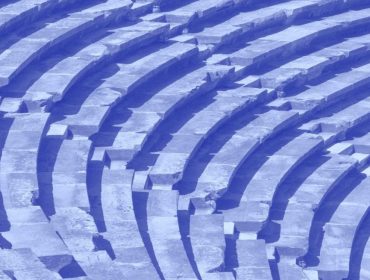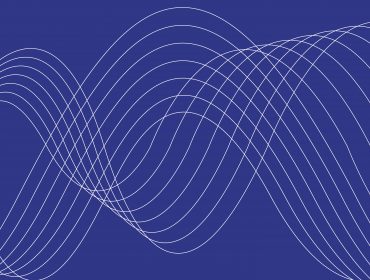Past Event
Should new music pacify or stimulate discord? Should it echo or challenge its audiences? Featuring artist Elaine Mitchener and music theorist Freya Jarman, two panels will debate how new music engages with the politics and publics of places, followed by workshops and performed interventions.
This event is part of the New Resonances Symposium, taking place at Whitechapel Gallery, Thursday 11 – Saturday 13 October.
Tickets for this event are made freely available through the support of Interfaces.
New Resonances is organised by Theatrum Mundi and the Onassis Cultural Centre, Athens, as part of the INTERFACES project supported by the Creative Europe Program of the European Union.
FRIDAY 12TH OCTOBER
11.30 Opening Remarks
John Bingham-Hall, Director, Theatrum Mundi
Christos Carras, Executive Director, Onassis Cultural Centre
11.45-13.15 Publics
Can new music ever reflect the cultures of its heterogeneous publics, and should it attempt to? Are new spaces for performance bringing new relationships between audience and performer, or replicating those staged by the concert hall? What are the values in different formations of public that are gathered by new rituals of performance.
Lia Mazzari, artist and founder of Silver Road
Sarah Jane Barnes, research student, Queen Mary University of London
Louis d’Heudieres, composer and PhD candidate at University of Bath
Chaired by Sam Mackay, Sound and Music, London
Additional programming and advisory support has been given by Sound and Music.
14.30-16.00 POLITICS
What are the structures of music’s engagement with the politics controversies of the sites it is performed in? Should it recount, mediate, pacify, or stimulate discord? How do geographies like those of exclusion and inclusion shape what is written and heard?
Freya Jarman, music theorist, University of Liverpool
Alexandra Lacroix, opera maker, CieMPDA (Paris)
Elaine Mitchener, performer (London)
Chaired by Julia Eckhardt, Q-02 Brussels
Performed Interventions
16.15 University of the Ghetto
in memoriam of the Whitechapel Library
An oral tribute by Elaine Mitchener
main staircase, duration: 15min
16.30 non-curated (summertime)
Ella Finer and Flora Pitrolo of the collective The International Western present a performance-composition based on the electromagnetic resonances of the Whitechapel Gallery. An experiment in listening to the non-curated sonic dimension of the building and in bringing the building as sonic document into the archive.
Gallery 4, duration: 10min, spaces limited
16.45-17.45 Workroom Conversations: on ritual /on voice
How other artistic practises deal with questions of architectures and geographies? Does site shape dance, sculpture, installation or writing in a similar or different way to its resonance in music? Two smaller conversations between practitioners from different disciplines drawing on Theatrum Mundi’s regular sessions looking at how ideas become form.
Sarah Jane Barnes is working on a part-time PhD supervised by Nicholas Ridout and Martin Welton at QMUL. Her research looks at the effect on audience-performer relationships of alternative sites and conventions for new or experimental classical music in London over the past decade. She has worked as a freelance violinist for over ten years, largely in orchestras. Past creative projects include combined music and visual art events, house concerts and talks, and site-specific, promenade concerts.
Christos Carras studied philosophy at the University of Cambridge and continued his postgraduate studies at Paris I-Sorbonne, where he completed his PhD. From 2002 to 2005 he was the Project Director of MediMuses Network, a Euro-Mediterranean project funded by the European Commission. In 2006 he was appointed as General Director of the B & M Theocharakis Foundation for the Fine Arts and Music. Since October 2009 he has been the General Manager and Artistic Director for Music of the Onassis Cultural Centre, Athens. In May 2013, he was awarded the Chevalier de l’ordre des arts et des lettres by the French Ministry of Culture.
Julia Eckhardt is a musician and curator in the field of the sounding arts. She is founding member and artistic director of Q-O2 workspace in Brussels, where she has curated various research-projects. As a viola player, she has been involved in various collaborations with composers and improvisers, of which extensively with Eliane Radigue. She has taught and lectured at art institutes in Leuven and Brussels. She is co-author of The Second Sound, conversations on gender and music, and author of Grounds for Possible Music.
Dr Freya Jarman is a Reader in Music at the University of Liverpool. Her work focuses on vocality and identity, particularly through the lens of queer theory, in relation to a range of musical genres. She is the author of Queer Voices: Technologies, Vocalities, and the Musical Flaw (Palgrave 2011), and editor of the Journal of the Royal Musical Association. Freya is presently working on a gendered history of singing high notes for Oxford University Press.
Alexandra Lacroix is a French opera director and set-designer who found her own lyrical company. Her work is a dialogue between different art fields. She creates new relationships between singers, musicians, performers and audience. As an artist she feels the responsibility to be aware of the topics of our society. Thinking about how to create new operas connected to everyone’s life, she engaged her work in 3 new operas, one about bullying in collaboration with the European network ENOA, one about transformation of the city, echoing urbanistic and social issues with Theatrum Mundi, and one about Shoah with IRCAM institution. With pieces from repertoire, she works on different layers and cultural references as well as everyday life.
Sam Mackay is a researcher and writer, and works with Sound and Music – the national charity for new music. Between 2013 and 2017 he was co-Director of London Contemporary Music Festival. He holds a PhD in Ethnomusicology from City, University of London. Recent writing has appeared in The Wire and in the audio festival Radiophrenia (Glasgow CCA).
Lia Mazzari is an artist who works with sound, environment and performance. In her individual and collaborative work she uses loose structures and an array of instruments including cello, whips and anything else at hand, to create performances and compositions that are at once delicate, harrowing, physical, playful and absurd. As an event curator, she founded Silver Road in 2016, a non-profit arts platform devoted to site-specific and time-based art practises. Recent Artists involved: Farmers Manual, Joe McPhee, Benedict Drew, Aine O’Dwyer, Lina Lapelyte, Path Thomas, Angharad Davies etc.
Elaine Mitchener is an experimental vocalist, movement artist and composer, whose work encompasses improvisation, contemporary music theatre and dance. Elaine studied voice at Trinity College of Music, London and now studies with Jacqueline Bremar. She has performed at numerous UK and European festivals and venues including Aldeburgh Music, London Contemporary Music Festival, Café Oto, 56th Venice Biennale, London ICA, Ultima Festival Oslo, and SAVVY Contemporary (Berlin) among others. Elaine has worked with an array of leading musicians and artists including Moor Mother (aka Camae Ayewa), Mark Padmore, Steve Beresford, Tansy Davies, Van Huynh Co, John Butcher, Apartment House, London Sinfonietta, Christian Marclay, Phil Minton, Irvine Arditti, George E. Lewis, Jason Yarde, Mark Sanders, Otolith Group, Sylvia Hallett, Sonia Boyce, Royal Opera House, Rolf Hind, Tansy Davies, Mark Padmore, Lucy Bailey, Pat Thomas.

Thu 11 Oct, 7pm
£9.50/£7.50 concs
Composer and producer Brian Eno and LSE Professor of Sociology Richard Sennett in conversation.

Sat 13 Oct, 11.30am – 6pm
Free, booking required
Featuring artists Haig Aivazian and Ella Finer, two panels will focus on the acoustics and memories of places.